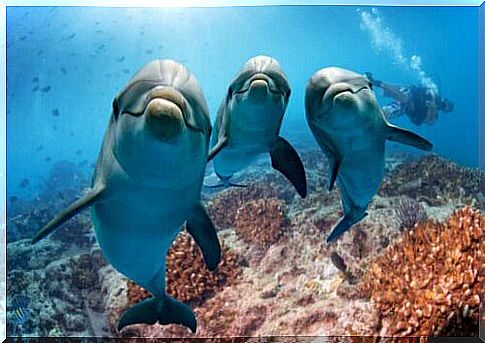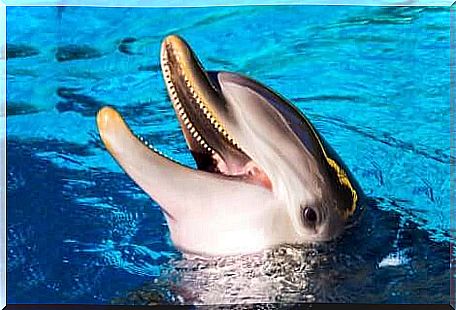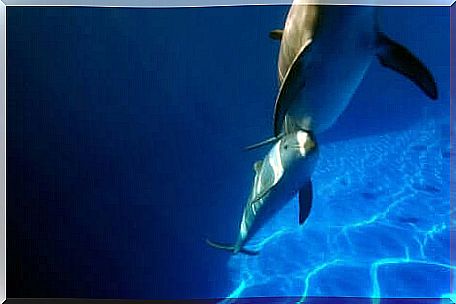Do Dolphins Feel Empathy? The Answer Is Surprising

Popular culture offers us countless stories of dolphins rescuing castaways, fishing and frequenting the shores in search of human company. All these stories logically ask us a question: do we humans really represent something for these animals? Does the fact that they bring someone who is drowning to safety mean that dolphins have empathy?
Empathy is a complex mental process that requires considerable cognitive development (speaking from an evolutionary point of view) and a social mind. Dolphins, even if they have these qualifications, have a reputation for not being as nice as zoologists try to make us believe. If you are interested in looking into this question, read on.
Empathy and theory of mind
We can define empathy as the cognitive ability of an individual to understand and feel participation in the feelings of the other. Have you ever been infected by a yawn? Perhaps, on some occasion, a friend has told you: “Don’t cry, otherwise I will cry too”. All of this is empathy: feeling what the other is feeling.
Empathy arises as an adaptive process present in social species, since it constitutes one of the most sophisticated mechanisms that exist to make coexistence between different individuals possible.
Without this characteristic, it is impossible to achieve group cohesion. Furthermore, the basic requirements of empathy also include self-awareness and the fact that it can be extended to other group members as well.
This projection of self-awareness is what we know as the theory of mind. A good example would be playing a specific song to a friend who is having a bad time, because we remember that, in the past, that song helped us to recover our fortitude.
In this way we are assuming that the same process is developing in his mind that has manifested in ours.

Dolphins and the theory of mind
Dolphins have amply demonstrated that they can recognize themselves when they see themselves reflected in a mirror, that they possess a complex social system, and that they employ remarkably sophisticated communication. What can we say about them, however, in relation to the theory of mind? Do dolphins attribute their mental states to others?
The answer is yes. In 2010, Uwano and his team of researchers demonstrated this theory through an experiment which showed that dolphins, trained to follow a series of gestural orders, were more likely to respond to the trainer’s direction of gaze rather than to his gestures.
In other words, the dolphins paid more attention to what they thought the trainer wanted than the orders he was giving. Based on these considerations, is it possible to say that dolphins feel empathy? The answer is yes. In the following lines, we explain how this fact has been demonstrated.
Dolphins feel empathy and act accordingly
Empathy is a process whose presence has already been demonstrated in the most varied non-human species, from small mice to elephants, but all we can do is study this phenomenon through indirect observation or, in other words, based on consequences it produces.
How can an individual be shown to have empathy? The answer is very simple: through helping behaviors.
Before any experiments were carried out, numerous suspicions had already been raised about the presence of empathy in dolphins. Here is some pretty clear evidence to back up this claim:
- Swimming under water in areas where dolphins are present is relatively dangerous, but not because these animals can attack you. Dolphins know that humans don’t breathe under water and try to save divers by thinking they are drowning. The sudden changes in pressure that occur when you rise to the surface too quickly can cause damage to the body.
- Dolphins defend other species from shark attacks. These large fish are the natural enemy of dolphins and there are many stories that tell how they defended bathers from shark attacks or acted as bait to keep them away from groups of whales.
- Dolphins help their own kind. When a dolphin is too weak or injured, the other members of the group swim around it to protect it and help it rise to the surface so it can breathe.
On the other hand, in controlled environments and under experimental conditions, the following behaviors were observed that support the presence of empathy in these animals:
- The enormous complexity of their social system is the breeding ground that favors the development of empathy. The dolphins’ big brains and their prolonged childhood create the perfect conditions for developing a sense of group cohesion and acting accordingly.
- The mother-child relationship is central to the development of empathy in dolphins. Mothers teach puppies how to behave within the group through their behavior, but also with their own words, since they are able to recognize each other through whistles and can talk to each other.
- Their ability to mimic behaviors is part of developing empathy. Thanks to some comparative psychology studies it was possible to observe that the dolphin cubs developed empathy towards the other members of the group by imitating the behavior of the mother.

As a conclusion, we will cite the famous anthropologist and ecologist Loren Eyseley. The latter spoke in fact of “getting rid of long loneliness” and making the human species get rid, after thousands of years, of that sense of isolation that leads us to believe that we are the only intelligent beings on earth. And what do you think of it?









